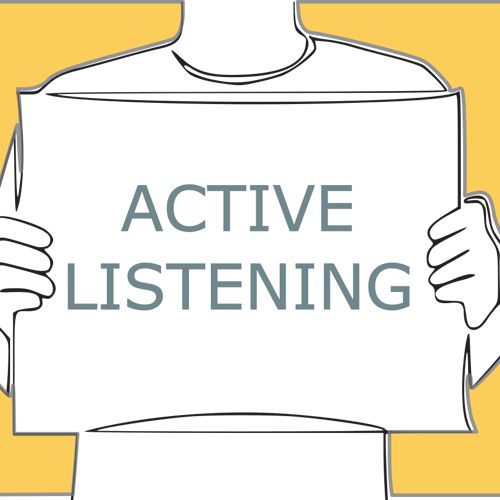Definition
Active listening refers to a pattern of listening that keeps you engaged with your conversation partner in a positive way. It is the process of listening attentively while someone else speaks, paraphrasing and reflecting back what is said, and withholding judgement and advice. Listening is not something that just happens (that is hearing), listening is an active process in which a conscious decision is made to listen to and understand the messages of the speaker. Read more at: https://www.skillsyouneed.com/ips/active-listening.html
There are many benefits for sharpening your active listening skills; including the earning of trust and respect of others as well as the ability to gain a better understanding of issues and problems – ultimately paving the road for better formulation of solutions.
Active listening is a skill and like any skill, it must first be acquire and then developed with practice. It is a complex skill and strong active listeners form a repertoire of techniques and approaches that they will bring together for given situations.
Practising active listening requires you to make a conscious effort to hear not only the words that another person is saying but, more importantly, the complete message being communicated. This means giving your full attention to the person speaking; refraining from distractions, resisting the temptation to form counter arguments in your head and being conscious of your body language and gestures.
Here are some tips on to help improve your active listening skills:
- Pay attention
- Make eye contact
- Remove any physical distractions – put away your phone, close the book you were reading, etc
- Listen to what is being said and dont form counter arguments
- Pay attention to the speakers body language
- Demonstrate engagement
- Nod occasionally and use open communication to encourage exploration of thoughts
- Smile – encourage them to keep talking
- Position yourself so that you have open, welcoming body language
- Mirror the speaker
- Provide feedback
- Paraphrase what has been said and seek confirmation of facts – “what i’m hearing is…” and “sounds like you mean…” are useful phrases.
- Challenge conflicting thoughts and mine for clarity
- Help shape direction – this isn’t an interview so don’t control the direction, but use your coaching skills to help the speaker explore their thoughts in an organised way
- Defer judgement
- Don’t interrupt!
- Let the speaker finish their points before asking questions
- Respond appropriately
- Be candid, open and honest in your response
- Own your opinions but deliver them with respect
- Be empathetic – work with the speaker how you would like to be treated if the roles were reversed









